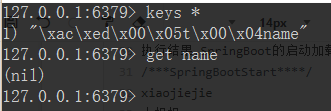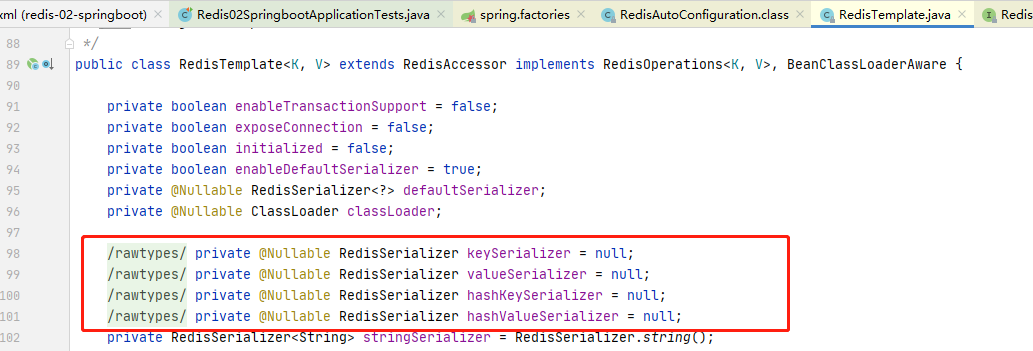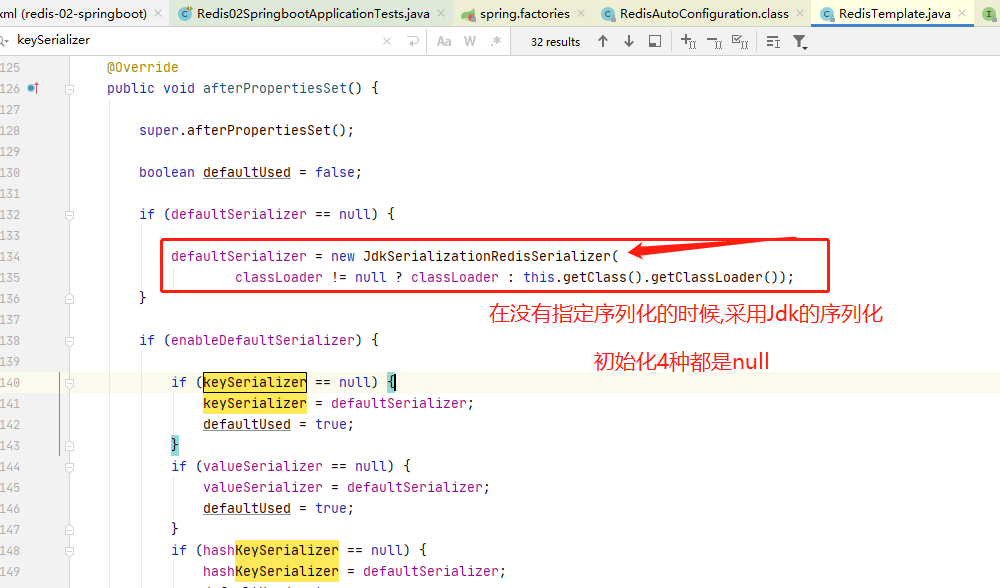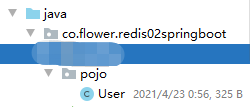Redis系统学习之自定义RedisTemplate
自定义RedisTemplate
序列化源码分析
- 在JAVA程序中看到中文是没有问题的,但是在Redis客户端工具,也就是命令行中看见是编码的

- 继续分析源码
- 查看RedisTemplate.class
- 在RedisAutoConfiguration.class中点击

- 在上面可以看到序列化支持的

- 往下稍微滑动一些可以看到,默认采用的是JDK的序列化,因为默认4种都是空的

- 但是我们一般都是采用JSON来做序列化的,这个时候就需要自己定义序列化了
默认序列化存在的问题
- 创建测试实体类,User

package co.flower.redis02springboot.pojo; import lombok.AllArgsConstructor; import lombok.Data; import lombok.NoArgsConstructor; import org.springframework.stereotype.Component; @Data @Component @AllArgsConstructor @NoArgsConstructor public class User { private String name; private int age; } 测试存储JSON /** * 测试默认序列化 */ @Test public void testSerial() throws JsonProcessingException { User user = new User("小姐姐", 18); // 使用jackson转换为字符串,我也没用过 String jsonUser = new ObjectMapper().writeValueAsString(user); redisTemplate.opsForValue().set("user",jsonUser); System.out.println(redisTemplate.opsForValue().get("user")); } 执行结果 {"name":"小姐姐","age":18} 测试存储对象User /** * 测试默认序列化 */ @Test public void testSerial() throws JsonProcessingException { User user = new User("小姐姐", 18); // 使用jackson转换为字符串,我也没用过 // String jsonUser = new ObjectMapper().writeValueAsString(user); redisTemplate.opsForValue().set("user",user); System.out.println(redisTemplate.opsForValue().get("user")); } 执行结果 // org.springframework.data.redis.serializer.SerializationException:
Cannot serialize; nested exception is org.springframework.core.serializer.support.SerializationFailedException:
Failed to serialize object using DefaultSerializer; nested exception is java.lang.IllegalArgumentException: DefaultSerializer requires
a Serializable payload but received an object of type [co.flower.redis02springboot.pojo.User] at org.springframework.data.redis.serializer.JdkSerializationRedisSerializer.serialize(JdkSerializationRedisSerializer.java:96)
- 提示不能序列化,因为没有实现Serializable接口,所以不能被JDKSerialzationRedisSerializer序列化
- 为User实现Serializable接口

- 再次测试,执行成功
- 返回结果:User(name=小姐姐, age=18)
自定义RedisTemplate
- 在java下创建config包,里面创建RedisConfig.java

- 复制源码中的代码进行改动
- 自己设置序列化方式
- 设置方法
- 通过redisTemplate对象进行设置
- 比如:setKeySerializer

- 点击入参

- 查看实现类,就知道有哪些能设置了

- 配置类代码 RedisConfig.java
package co.flower.redis02springboot.config; import com.fasterxml.jackson.annotation.JsonAutoDetect; import com.fasterxml.jackson.annotation.PropertyAccessor; import com.fasterxml.jackson.databind.ObjectMapper; import org.springframework.boot.autoconfigure.condition.ConditionalOnMissingBean; import org.springframework.boot.autoconfigure.condition.ConditionalOnSingleCandidate; import org.springframework.context.annotation.Bean; import org.springframework.context.annotation.Configuration; import org.springframework.data.redis.connection.RedisConnectionFactory; import org.springframework.data.redis.core.RedisTemplate; import org.springframework.data.redis.serializer.Jackson2JsonRedisSerializer; import org.springframework.data.redis.serializer.StringRedisSerializer; @Configuration public class RedisConfig { @Bean public RedisTemplate<String, Object> redisTemplate(RedisConnectionFactory redisConnectionFactory) { RedisTemplate<String, Object> template = new RedisTemplate(); template.setConnectionFactory(redisConnectionFactory); // JSON序列化配置 不需要被,不需要知道具体参数含义 大概知道是做什么的就可以 这个就是采用JSON序列化对象 Jackson2JsonRedisSerializer jackson2JsonRedisSerializer = new Jackson2JsonRedisSerializer(Object.class); ObjectMapper om = new ObjectMapper(); om.setVisibility(PropertyAccessor.ALL, JsonAutoDetect.Visibility.ANY); om.enableDefaultTyping(ObjectMapper.DefaultTyping.NON_FINAL); jackson2JsonRedisSerializer.setObjectMapper(om); // String的序列化配置 StringRedisSerializer stringRedisSerializer = new StringRedisSerializer(); // 所有的Key通过String序列化 template.setKeySerializer(stringRedisSerializer); template.setHashKeySerializer(stringRedisSerializer); // 所有的value通过JSON序列化 template.setValueSerializer(jackson2JsonRedisSerializer); template.setHashValueSerializer(jackson2JsonRedisSerializer); // 调用刚才看的序列化源码中默认的方法,重新设置序列化 template.afterPropertiesSet(); return template; } } 采用自定义配置之后,清空数据库再次测试测试代码如下 /** * 测试自定义序列化 */ @Test public void testSerial() throws JsonProcessingException { User user = new User("小姐姐", 18); // 使用jackson转换为字符串,我也没用过 // String jsonUser = new ObjectMapper().writeValueAsString(user); redisTemplate.getConnectionFactory().getConnection().flushDb();// 清空数据库 redisTemplate.opsForValue().set("user",user); System.out.println(redisTemplate.opsForValue().get("user")); }
- 没有问题,查询数据库,直接从客户端查询

- 也没有问题,OK,nice,开发中如果使用的话,直接拷贝就可以用了!当然是配置类,但是一般开发中不直接在业务中引入redisTemplate,而是编写一个RedisUtils工具类,来包装一下默认的,因为使用起来比较麻烦~,我就不照着视屏巧了,好几百行[捂脸],用的时候直接从公司拿,没有的话百度一个!
问题AQF:
依赖报错:
在依赖redis的时候不要指定泛型,不然会报错
/** * 我居然直接就指定了泛型 RedisTemplate<String,Object>结果就直接报错了,删除泛型后成功 */ @Autowired private RedisTemplate redisTemplate;
作者:彼岸舞
时间:2021\05\05
内容关于:Redis
本文属于作者原创,未经允许,禁止转发
分类:
Redis






【推荐】国内首个AI IDE,深度理解中文开发场景,立即下载体验Trae
【推荐】编程新体验,更懂你的AI,立即体验豆包MarsCode编程助手
【推荐】抖音旗下AI助手豆包,你的智能百科全书,全免费不限次数
【推荐】轻量又高性能的 SSH 工具 IShell:AI 加持,快人一步
· AI与.NET技术实操系列(二):开始使用ML.NET
· 记一次.NET内存居高不下排查解决与启示
· 探究高空视频全景AR技术的实现原理
· 理解Rust引用及其生命周期标识(上)
· 浏览器原生「磁吸」效果!Anchor Positioning 锚点定位神器解析
· 全程不用写代码,我用AI程序员写了一个飞机大战
· DeepSeek 开源周回顾「GitHub 热点速览」
· 记一次.NET内存居高不下排查解决与启示
· 物流快递公司核心技术能力-地址解析分单基础技术分享
· .NET 10首个预览版发布:重大改进与新特性概览!